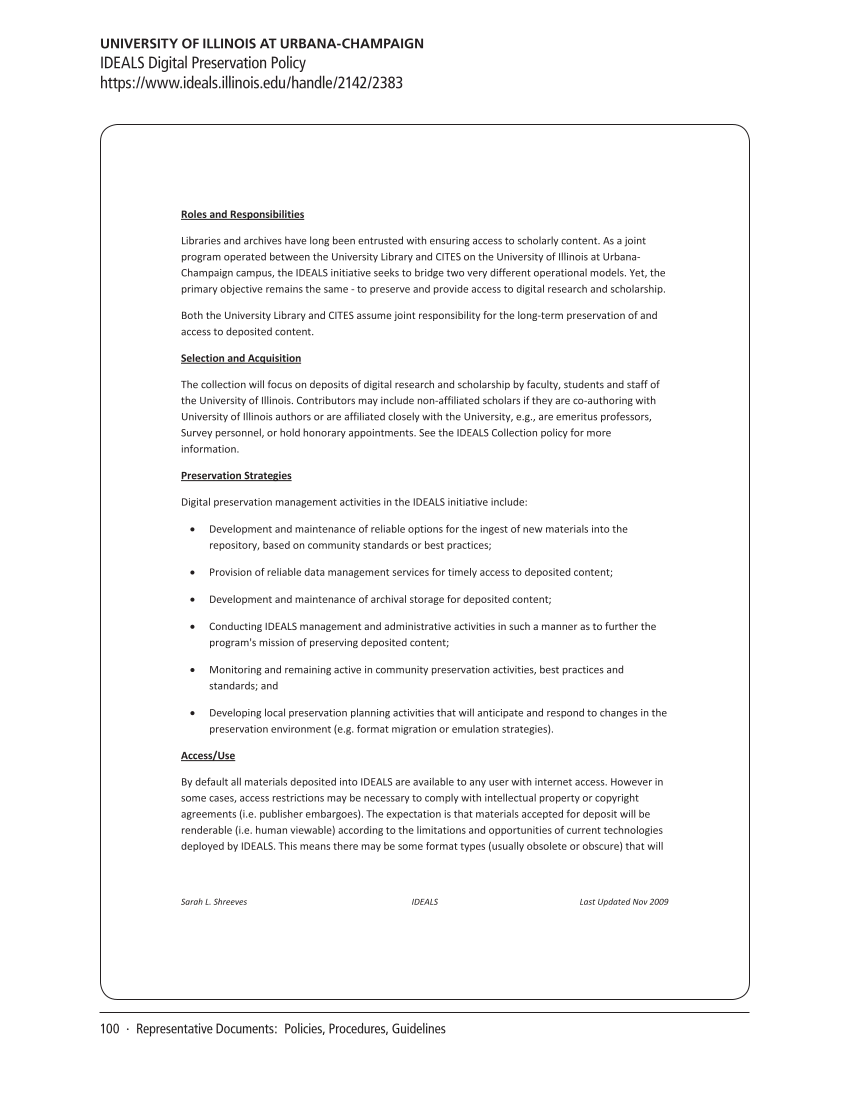100 · Representative Documents: Policies, Procedures, Guidelines
University of Illinois at Urbana-Champaign
IDEALS Digital Preservation Policy
https://www.ideals.illinois.edu/handle/2142/2383
Sarah L. Shreeves IDEALS Last Updated Nov 2009
Roles and Responsibilities
Libraries and archives have long been entrusted with ensuring access to scholarly content. As a joint
program operated between the University Library and CITES on the University of Illinois at Urbana-
Champaign campus, the IDEALS initiative seeks to bridge two very different operational models. Yet, the
primary objective remains the same -to preserve and provide access to digital research and scholarship.
Both the University Library and CITES assume joint responsibility for the long-term preservation of and
access to deposited content.
Selection and Acquisition
The collection will focus on deposits of digital research and scholarship by faculty, students and staff of
the University of Illinois. Contributors may include non-affiliated scholars if they are co-authoring with
University of Illinois authors or are affiliated closely with the University, e.g., are emeritus professors,
Survey personnel, or hold honorary appointments. See the IDEALS Collection policy for more
information.
Preservation Strategies
Digital preservation management activities in the IDEALS initiative include:
• Development and maintenance of reliable options for the ingest of new materials into the
repository, based on community standards or best practices
• Provision of reliable data management services for timely access to deposited content
• Development and maintenance of archival storage for deposited content
• Conducting IDEALS management and administrative activities in such a manner as to further the
program's mission of preserving deposited content
• Monitoring and remaining active in community preservation activities, best practices and
standards and
• Developing local preservation planning activities that will anticipate and respond to changes in the
preservation environment (e.g. format migration or emulation strategies).
Access/Use
By default all materials deposited into IDEALS are available to any user with internet access. However in
some cases, access restrictions may be necessary to comply with intellectual property or copyright
agreements (i.e. publisher embargoes). The expectation is that materials accepted for deposit will be
renderable (i.e. human viewable) according to the limitations and opportunities of current technologies
deployed by IDEALS. This means there may be some format types (usually obsolete or obscure) that will
University of Illinois at Urbana-Champaign
IDEALS Digital Preservation Policy
https://www.ideals.illinois.edu/handle/2142/2383
Sarah L. Shreeves IDEALS Last Updated Nov 2009
Roles and Responsibilities
Libraries and archives have long been entrusted with ensuring access to scholarly content. As a joint
program operated between the University Library and CITES on the University of Illinois at Urbana-
Champaign campus, the IDEALS initiative seeks to bridge two very different operational models. Yet, the
primary objective remains the same -to preserve and provide access to digital research and scholarship.
Both the University Library and CITES assume joint responsibility for the long-term preservation of and
access to deposited content.
Selection and Acquisition
The collection will focus on deposits of digital research and scholarship by faculty, students and staff of
the University of Illinois. Contributors may include non-affiliated scholars if they are co-authoring with
University of Illinois authors or are affiliated closely with the University, e.g., are emeritus professors,
Survey personnel, or hold honorary appointments. See the IDEALS Collection policy for more
information.
Preservation Strategies
Digital preservation management activities in the IDEALS initiative include:
• Development and maintenance of reliable options for the ingest of new materials into the
repository, based on community standards or best practices
• Provision of reliable data management services for timely access to deposited content
• Development and maintenance of archival storage for deposited content
• Conducting IDEALS management and administrative activities in such a manner as to further the
program's mission of preserving deposited content
• Monitoring and remaining active in community preservation activities, best practices and
standards and
• Developing local preservation planning activities that will anticipate and respond to changes in the
preservation environment (e.g. format migration or emulation strategies).
Access/Use
By default all materials deposited into IDEALS are available to any user with internet access. However in
some cases, access restrictions may be necessary to comply with intellectual property or copyright
agreements (i.e. publisher embargoes). The expectation is that materials accepted for deposit will be
renderable (i.e. human viewable) according to the limitations and opportunities of current technologies
deployed by IDEALS. This means there may be some format types (usually obsolete or obscure) that will






























































































































































